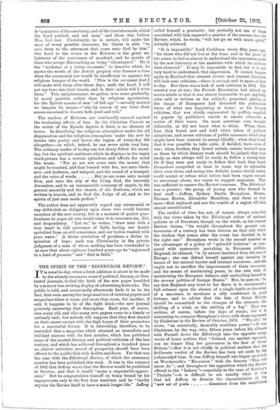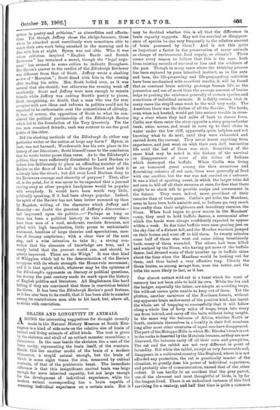THE SPIRIT OF THE "EDINBURGH REVIEW."
IT is usual to-day, when a fresh addition is about to be made to the already enormous mass of political, literary, or illus- trated journals, to find the birth of the new paper heralded by a more or less striking display of advertising fireworks. The public is told, and occasionally afterwards finds it to be the fact, that even among the large numbers of existing papers and magazines there is room, and more than room, for another, if only it happens to be of the right kind,—the new journal precisely answering that description. Each year, of course, sees many old, and also many new, papers come to a timely or untimely end; but nobody will suppose that they first started on their career except with the high hopes of their promoters for a successful future. It is interesting, therefore, to be reminded that a magazine which attained an immediate and brilliant success with its first number, which has published some of the acutest literary and political criticism of the last century, and which has achieved throughout a hundred years an almost unbroken record of prosperity, should have been offered to the public first with doubts and fears. Yet that was the case with the Edinburgh Review, of which the centenary number has been published this week. It was in the summer of 1802 that Jeffrey wrote that the Review would be published in October, and that it would "make a respectable appear- ance." But he congratulates himself on being bound by his engagements only to the first four numbers, and he "hardly expects the Review itself to have a much longer life." Jeffrey
called himself a pessimist; but probably not one of those associated with him expected a quarter of the success that the Review, which, he wrote, "will not go on with much spirit," actually achieved.
"It is impossible," Lord Cockburn wrote fifty years ago, " for those who did not live at the time, and in the heart of the scene, to feel or almost to understand the impression made by the new luminary or the anxieties with which its motions were observed." It may be impossible to feel, but it is not very hard to understand, that impression. It cannot happen again in England that current events and current literature will lack sane criticism,—there is enough and to spare of that to-day. But there was a lack of such criticism in 1802. The country was at war; the French Revolution had stirred up men's minds so that it was almost impossible to get anything calm said or written on the subject ; perpetual glaring at the image of Bonaparte had distorted the politician's views of what was happening at home ; as for literary criticism, that was chiefly represented by puffery supplied to papers by publishers unable to ensure otherwise a notice of their wares. On most questions men thought illiberally, or did not know what to think. When, there- fore, they found new and bold views taken of political situations, and severe criticism of public measures which they might have been content to accept blindly ; when they found that it was possible to take calm, if decided, views even of war; when, further, they found certain canons insisted upon as those by which literary work should be judged, they were ready, as men always will be ready, to follow a strong lead. Or if they were not ready to follow that lead, they found themselves compelled at least in some way to crystallise their own views, and seeing two definite issues clearly stated, could accept or refuse what before had been vague enough to encourage abuse, too vague to suggest argument. That was sufficient to ensure the Review's success. The Edinburgh was a pioneer ; the group of young men who formed its first staff —Jeffrey, Sydney Smith, Brougham, Homer, Thomas Brown, Alexander Hamilton, and three or four more—first explored and saw the wealth of a region till then almost uncultivated.
The verdict of time has not, of course, always coincided with the views taken by the Edinburgh either of national policies or of literature, though on the whole, as the current Review claims, " its weight throughout the greater con- troversies of a century has been thrown on that side which the wisdom that comes after the event has decided to be the right one." Brougham wrote in the second number on the advantages of a policy of " splendid isolation" as com- pared with systematic partaking in European politics. England, he claimed, "is by nature insulated from the rest of Europe ; she can defend herself against any invasion by means of her natural barrier and internal resources ; and she ought not to sacrifice the improvement of these resources, and the means of maintaining peace, to the vain wish of maintaining the European balance, and embroiling herself in the stormy politics of foreign States." But, he goes on, " to say that England may trust to her fleets is to recommend a full reliance upon the chance of a single battle or the event of a sea-chase, to inculcate a silly confidence in good fortune, and to advise that the fate of Great Britain should be committed to the changes of the elements, the shifting of a wind, or the settling of a fog." That was written, of course, before the days of steam ; but it is interesting to compare Brougham's views with those expressed by Gladstone in the Review of October, 1870. We are," be wrote, "an essentially, incurably maritime power."—It was Gladstone, by the way, who, fifteen years before his alliance with Parnell drove the Edinburgh into the opposite camp, wrote of home politics that " Ireland, our ancient reproach, can no longer fling her grievances in the face of Great Britain."—But it is not chiefly in political matters that the deliberate verdict of the Review has been set aside by the judgmentjof time. It was Jeffrey himself who began an article on Wordsworth's " Excursion " with the famous " This will never do "; and throughout the opposition which the Review offered to the " Lakers "—especially in the case of Southey s " Thalaba "—it is difficult to see exactly what it was that led Jeffrey to dismiss the characteristics of. the " new set of poets dissenters from the established system in poetry and criticism," as absurdities and affecta- tions. Yet though Jeffrey chose the sledge-hammer, those whom he attacked most mercilessly were sometimes able to watch their own work being smashed in the morning and to dine with him at night. Byron was not able. Who it was whose criticism inspired " English Bards and Scotch Reviewers " has remained a secret, though the " legal argu- ment" has seemed to some critics to indicate Brougham. But Byron's answer to the verdict of the Edinburgh Reviewer was different from that of Scott. Jeffrey wrote a slashing review of " Harmion " ; Scott dined with him in the evening after reading his critic. Mrs. Scott boiled over, as it was natural that she should; but otherwise the evening went off excellently. Scott and Jeffrey were men enough to remain friends while Jeffrey was cutting Scott's poetry to pieces, Scott recognising, no doubt, that a man who was for ever occupied with new ideas and reforms in politics could not be expected to be enthusiastic over the romanticism of chivalry. It was, of course, the opposition of Scott to what he con- sidered the political partisanship of the Edinburgh Review which led to the foundation of the Tory Quarterly. Yet the two men remained friends; each was content to see the good points of the other.
Did the slashing methods of the Edinburgh do either any particular writer or the nation at large any harm P Byron, at least, was not harmed; Wordsworth has his own place in the history of our literature ; Scott himself came to the conclusion that he wrote better prose than verse. As to the Edinburgh's politics, they were sufficiently distasteful to Lord Buchan to induce him deliberately to place an offending number of the Review on the floor of his hall in George Street and kick it solemnly into the street ; but did even Lord Buchan deny to the Reviewers courage and sincerity of purpose ? That, after all, is the point, for it was never to be expected that a journal carving away at other people's headpieces would be popular with everybody. It would have been worth very little, politically speaking, if it had been always popular. Indeed, the spirit of the Review has not been better summed up than by Bagehot, writing of the character which Jeffrey and Macaulay—no doubt the greatest of Jeffrey's discoveries— had impressed upon its politics :—" Perhaps as long as there has been a political history in this country there have been men of a cool, moderate, resolute firmness, not gifted with high imagination, little prone to enthusiastic sentiment, heedless of large theories and speculations, care- less of dreamy scepticism ; with a clear view of the next step, and a wise intention to take it ; a strong con- viction that the elements of knowledge are true, and a steady belief that the present world can, and should, be quietly improved. These are the Whigs." It was that kind of Whiggism which led to the determination of the Review to oppose with its whole strength the Home-rule movement; and it is that spirit which, whatever may be the opinions of the Edinburgh's opponents on literary or political questions, has during the past century made its mark upon the history of English politics and literature. All Englishmen like hard hitting if they are convinced that there is conviction behind the blows. It has been the Edinburgh Review's good fortune, as it has also been to its credit, that it has been able to number among its contributors men able to hit hard, but, above all, to strike with conviction.











































 Previous page
Previous page